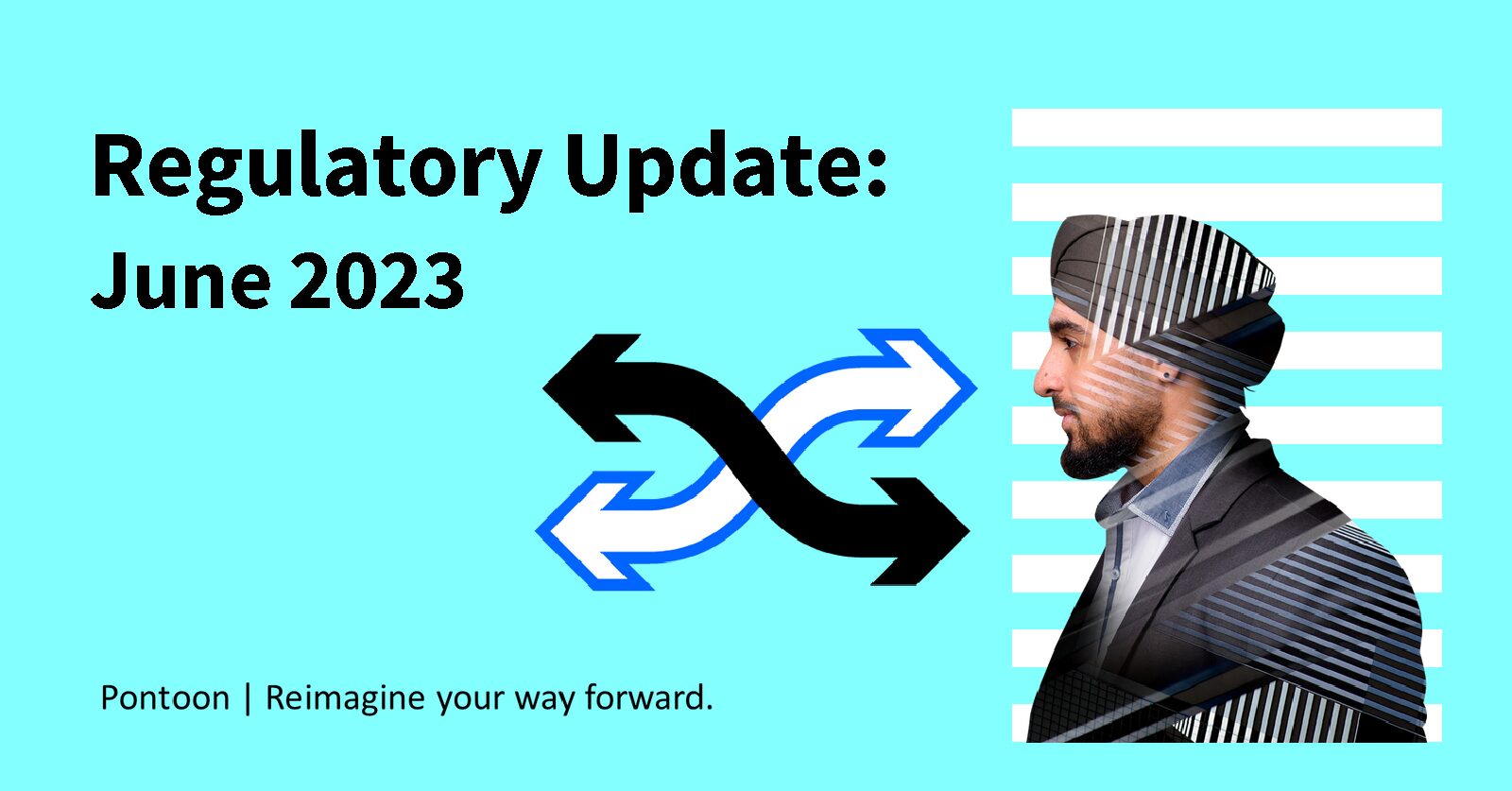Regulatory Update: Q4 2023
In our Q4 2023 Regulatory Update, we explore the latest regulatory news and insights affecting the world of work.
Our regulatory update provides a concise summary of global employment news that could impact your organisation, including new legislation, policy changes, market trends, and Pontoon’s key takeaways for employers.
Illinois Day and Temporary Labour Services Act
Expanding rights for temporary and day workers
House Bill 2862 amends the January 2000 Illinois Day and Temporary Labour Services Act by expanding the rights of temporary and day workers and adding new provisions to the existing law. The law applies to temporary workers in all job roles, except clerical and professional positions requiring advanced knowledge in a field of science or learning. Notable changes that will impact employers include:
- Equal pay and benefits for staffing employees after 90 days
- Disclosure of placement fees to staffing employees
- Restricts staffing agencies from assigning workers to sites with ongoing labour disputes
Temporary workers assigned for 90 days or more should receive the same pay and benefits (or cash equivalent) as an employer’s lowest-paid employee doing similar work. Employers must inform staffing agencies about potential job hazards and provide industry-specific training. They may also need to share information for updated wage notices and verification forms for single-day assignments.
Key considerations
A day and temporary labour service agency or client found to have violated any provision of the Act is subject to a civil penalty of not less than $100 and not more than $18,000 for the first violation. Any subsequent breach is subject to a civil liability of not less than $250 and not more than $7,500.
“Interested part[ies]” can also now sue, and if they prevail, they will receive 10% of any assessed statutory penalties along with expenses and attorneys fees.
Employers need to be asking themselves “How do we plan to comply with the pay equity requirements of the Act” and “What’s our overall strategy to remain in compliance?”
Here are a few more things that employers must consider:
- Speak with your legal and HR teams to help mitigate risk.
- Be prepared to (a) issue staffing providers information about health and safety hazards, labour disputes, and pay and benefit details for comparator employees and (b) provide a Work Verification Form to any temporary associate assigned to one-day assignments for roles in scope.
- Read all amendments and emergency rules.
Singapore’s new compass system
A more inclusive approach to hiring
Starting in September 2023, Singapore’s Ministry of Manpower (MoM) introduced a new framework named COMPASS (Complementarity Assessment) to assess Employment Pass (EP) applications. This system enhances the work visa process, promoting global talent acquisition and local workforce development.
COMPASS operates on a transparent points-based system, providing businesses with clear guidelines for staffing planning. This system considers firm- and employee-level characteristics, encouraging employers to hire high-quality foreign professionals while fostering diversity and a robust local workforce.
The implementation of COMPASS simplifies the hiring of overseas talent for companies that are already contributing to diversity and local employment goals. However, companies falling short of these targets will face stricter requirements related to the salary and qualifications of their prospective foreign hires.
Firm-level categories within COMPASS include diversity, local employment, and strategic priorities, while employee-level categories encompass salary, qualifications, and skills shortage. This inclusive approach ensures a fair and comprehensive assessment of each application.
Key considerations
The COMPASS framework represents a shift in Singapore’s approach to employment passes, emphasising a balanced mix of global and local talent.
Employers should familiarise themselves with this new system and adapt their talent management strategies to meet its requirements. Through a strategic approach to hiring, businesses can thrive under this new framework while contributing to Singapore’s dynamic and diverse workforce.
US labour updates
Affirmative action to impact diverse hiring
Recent developments in Diversity, Equity, and Inclusion (DE&I) have stirred the US business community, particularly the Supreme Court’s verdict on affirmative action in college admissions. Expected to end race-conscious admission procedures, this ruling disrupts two decades of norms and may influence future legal actions around diverse hiring and recruitment methodologies. However, this doesn’t directly impact employers.
Despite these changes, the importance of DE&I initiatives remains paramount. It’s crucial for businesses to continue championing diversity aims, as a diverse talent pool is vital for operational success. Businesses can enhance their efforts through skills-based recruitment, which can help reach a more diverse array of proficient candidates from various backgrounds.
Key considerations
- Skills-based recruitment not only mitigates bias but also prioritises job performance.
- Engaging with partners or providers renowned for cultivating and tapping into diverse talent pipelines can be highly beneficial.
- Encouraging an inclusive workplace, where individuals from all walks of life can excel, stands as a pivotal strategy to attract a varied pool of talent.
- Adhering to job requirement guidelines and recommendations such as pay transparency can significantly augment the reach for candidates from diverse backgrounds.
Global employment news
Inflation and the evolution of real wage directives
In the face of inflation and cost-of-living crises, several countries have reassessed their minimum wage rates over the past two years. For example, the average minimum wage levels increased by 11.2% across EU states within a year, and about half of the US states have announced plans to raise their minimum wages in 2023. Other countries, such as Chile and Australia, have also enacted legislation to increase their minimum wages. Simultaneously, due to the rise in minimum wages and increased labour demand, there has been an overall elevation in wage levels to attract more workers.
However, due to high inflation rates, the real annual wage growth was negative in most countries. Wages in Europe grew the most in utilities, followed by services and industry. In the UK, the finance and business services sector saw the largest annual regular growth rate, followed by the manufacturing sector. In the US, hospitality and leisure, and service occupations experienced significant wage growth. Looking ahead, inflation and wage inflation continue to slow across geographies, and unemployment is expected to hit a more general recession in 2024 according to some analysts.
Key considerations
Employers operating within EU member states should be aware of several key factors that may require action.
- Plan for increased costs: Employers will need to account for potential increases in labour costs as minimum wage levels rise.
- Adjust wage structures: Employers may need to adjust their wage structures and increase pay transparency. This includes increasing wages for employees already earning above the new minimum wage level.
Areas to watch for the rest of 2023
Exciting times are ahead for the rest of 2023. The US and the EU are preparing for their upcoming elections in 2024 and are actively exploring policies related to AI, technology, and employment.
Despite analysts pushing recession predictions to 2024, economic uncertainty lingers. Various factors like moderating inflation, sluggish job growth, and ongoing geopolitical tensions add to the unpredictability.
We are also witnessing a combination of labour shortages, layoffs, and increasing attention on pay transparency and environmental sustainability due to the growing impact of climate change.
Key considerations
Considering the evolving landscape of temporary work and the increasing demand for equal pay, it’s crucial for employers to stay on top of these issues or risk losing talent to the competition.
- Reassessment of benefits structure: The notion of extending the full benefits range to temp workers represents a significant shift in the traditional model of temporary employment. This could potentially impact the cost-effectiveness of engaging temp workers. Employers need to reassess their benefits structure and consider the financial implications of such changes.
- Understanding the regulations: The regulations around equal pay for temp workers are complex and still developing. Employers must stay informed about the current legal landscape and anticipate potential changes. It’s essential to understand the definition and range of liability as per the new laws.
Country announcements
United Kingdom
A UK court has struck down legislation that would allow for the replacement of striking workers through temporary (agency) workers. More
Germany
Following a ruling of the European Court of Justice (ECJ) on the European rules on equal pay for agency workers, the German Federal Labour Court decided that the German implementation meets the EU rules. More
France
Social unrest following a pension reform is likely to persist as the government plans a new set of reforms (“Full Employment Bill”). More
Brazil
Brazil adopted new regulation for companies to report on gender pay gaps. The law is passed through the lower house of the Brazilian congress. More
United States
The Equal Employment & Opportunity Committee (EEOC) published guidelines on the use of artificial intelligence in employment selection procedures. More
Regulations on employment firms in china
The Chinese government recently published regulations governing recruitment platforms and agencies that collect and publish information on jobs and offer human resources management consultation services. The regulation, which took effect on August 1, clarifies the administrative authorisation, service standards and supervision of human resources agencies and platforms.
For example, they should set up a job information management system to check the authenticity and validity of job information that employers offer or should not find jobs for children under the age of 16.
Key considerations
The new regulation can help improve agencies and protect their and the workers’ rights. Employers must ensure that their job postings are both authentic and valid. The regulations mandate the establishment of a job information management system to verify these aspects. This means companies will need to invest in rigorous checks and balances to maintain the integrity of their job listings.
Secondly, the age of potential employees is a significant factor. The rules explicitly prohibit finding jobs for children under the age of 16. Employers should therefore implement stringent age verification processes during recruitment to comply with this directive.
These changes underscore the importance of transparency and ethical practices in talent acquisition. By adhering to these guidelines, employers can contribute to furthering an inclusive, fair, and compliant workspace.
Disclaimer:
The information provided herein does not, and is not intended to, constitute legal advice; all information, content, and materials available in this newsletter are for general informational purposes only. Information herein may not constitute the most up-to-date legal or other information. You should contact your attorney to obtain advice concerning any legal matter, including but not limited to the general information contained herein.
Related Post
In our June 2023 Regulatory Update, we explore the latest regulatory news and insights affecting the world of work.
Our newsletter provides a concise summary of global employment updates that could ...





